India is home to some of the best cancer hospitals offering world-class breast cancer treatments at affordable rates. Renowned hospitals like Tata Memorial Hospital (Mumbai), AIIMS (Delhi), Apollo Cancer Centres, and Fortis Memorial Research Institute (Gurgaon) provide cutting-edge technology and advanced treatment options.
These include a combination of surgery, chemotherapy, targeted therapies, immunotherapy, hormone therapy, and radiation therapy. The cost of the best breast cancer treatments in India typically ranges from INR 4,00,000 to INR 10,00,000, depending on the stage of cancer and the hospital chosen. These innovative treatments, such as immunotherapy and hormone therapy, enhance the body's ability to fight breast cancer effectively.
What is Breast Cancer?
Breast cancer is a type of cancer that develops in the cells of the breasts, typically originating in the ducts or lobules. It can spread to other parts of the body if not detected and treated early. In India, breast cancer is a significant health concern, particularly affecting women, though men can also develop it.
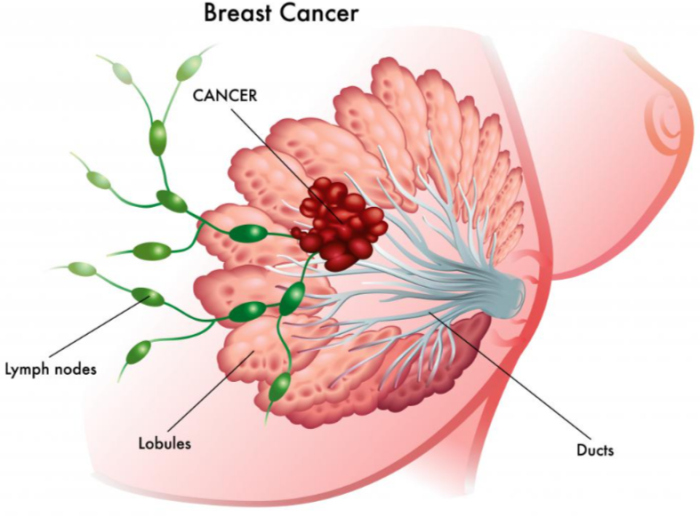
Symptoms and Causes of Breast Cancer
Common symptoms of breast cancer include a lump in the breast or underarm, changes in breast size or shape, nipple discharge, and skin changes on the breast such as dimpling or redness. These symptoms can sometimes be subtle and easily mistaken for benign conditions.
The causes of breast cancer are not fully understood, but risk factors include age, family history of breast or ovarian cancer, genetic mutations (such as BRCA1 and BRCA2), hormone replacement therapy, and prolonged exposure to estrogen.
Treatment for Early-Stage Breast Cancer in India
Early-stage breast cancer, if detected, is often treated successfully with surgery and sometimes chemotherapy, radiation, or hormone therapy. Minimally invasive surgeries, like lumpectomy or sentinel lymph node biopsy, are commonly performed in India for breast cancer in its early stages.
Hospitals in India offer advanced treatment protocols that follow international standards, with many oncologists specializing in breast cancer treatments, ensuring a high chance of success and quicker recovery times.
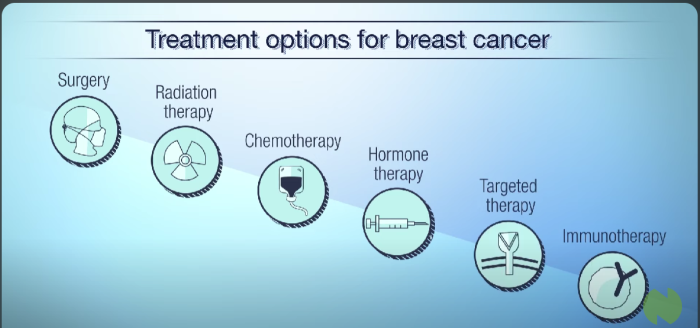
Treatment for Advanced-Stage Breast Cancer in India
Advanced-stage breast cancer treatments include a combination of surgery, chemotherapy, targeted therapies, immunotherapy, and hormone therapy. India's leading cancer hospitals provide comprehensive care, utilizing cutting-edge technologies like robotic surgery and personalized medicine for patients with advanced breast cancer.
1.Surgery for Breast Cancer Treatment
Surgery, such as mastectomy or lumpectomy, is often performed to remove as much of the tumor as possible. In some cases, advanced breast cancer surgery also involves removing nearby lymph nodes, followed by chemotherapy, radiation, or targeted therapy.
Know more about Surgery
2.Chemotherapy for Late-Stage Breast Cancer Treatment
Chemotherapy is a cornerstone treatment for advanced breast cancer. The standard approach includes a combination of drugs like anthracyclines (doxorubicin), taxanes (paclitaxel), or other agents depending on the cancer subtype. Neoadjuvant chemotherapy, administered before surgery, may also be recommended to shrink the tumor.
Know More About Chemotherapy
3.Different Types of Targeted Therapy for Late-Stage Breast Cancer
- HER2-Targeted Therapies (e.g., trastuzumab, pertuzumab): These drugs are effective for patients whose breast cancer tests positive for HER2 receptors.
- CDK4/6 Inhibitors (e.g., palbociclib, ribociclib): These drugs are used to slow the growth of hormone receptor-positive, HER2-negative advanced breast cancer.
- PARP Inhibitors (e.g., olaparib): Effective for patients with BRCA mutations or genetic predispositions.
Know more about Targeted Therapy
4.Hormone Therapy for Late-Stage Breast Cancer Treatment
Hormone therapy is used to slow the growth of hormone receptor-positive breast cancers. Drugs like tamoxifen or aromatase inhibitors are commonly used in advanced cases.
Know More about Hormone therapy
5.Immunotherapy for Advanced-Stage Breast Cancer Treatment
Immunotherapy is emerging as a treatment for certain types of advanced breast cancer, particularly triple-negative breast cancer (TNBC). Drugs like pembrolizumab (a checkpoint inhibitor) have shown promising results in clinical trials.
Know More about Immunotherapy
6.Clinical Trials for Advanced-Stage Breast Cancer Treatment
Patients may also explore clinical trials to access experimental treatments, including new drug combinations, cancer vaccines, or innovative immunotherapies that are not yet widely available.
Latest Advancements in Breast Cancer Treatment
Recent advancements in breast cancer treatment focus on targeted therapies like HER2 inhibitors (e.g., trastuzumab) and CDK4/6 inhibitors (e.g., palbociclib), which specifically target cancer cells while sparing healthy ones. Immunotherapy, particularly for triple-negative breast cancer (TNBC), is also gaining ground by boosting the body’s immune response to cancer.
Research into gene therapy and personalized medicine is showing promise in offering more effective, tailored treatments. Leading hospitals in India are adopting these cutting-edge technologies to provide advanced treatment options for breast cancer patients.
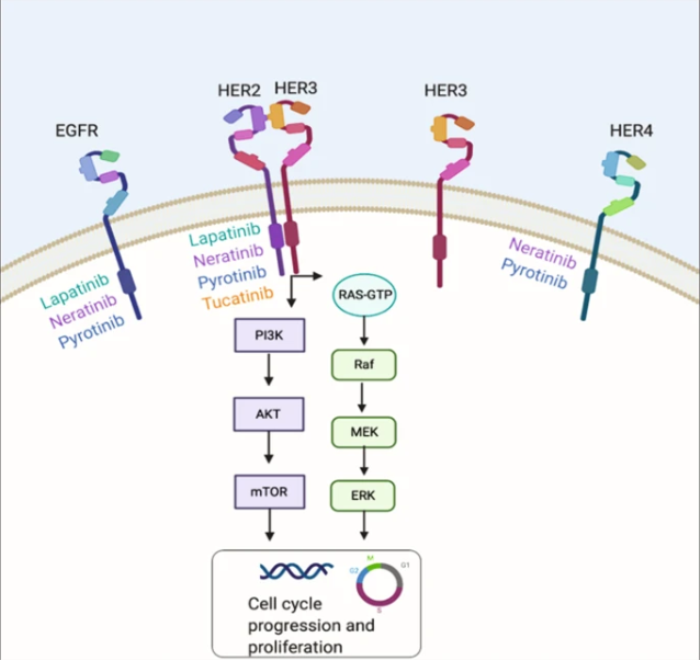
Hospitals in India Offering Advanced Breast Cancer Therapies
Leading cancer hospitals in India offering advanced breast cancer treatments include Tata Memorial Hospital (Mumbai), AIIMS (Delhi), Apollo Cancer Centres, Fortis Memorial Research Institute (Gurgaon), and Max Super Speciality Hospital.
These hospitals are equipped with state-of-the-art facilities and experienced oncologists, giving patients access to cutting-edge therapies such as targeted treatments, immunotherapy, and personalized care plans for effective breast cancer management.
Top Hospitals and Oncologists for Breast Cancer Treatment
Top hospitals offering excellent breast cancer treatment in India include Tata Memorial Hospital, AIIMS (All India Institute of Medical Sciences), and Apollo Hospitals. Leading oncologists such as Dr. Ramesh Sarin, Dr. Rajendra Badwe, and Dr. Suresh Advani are renowned for their expertise in breast cancer treatment, utilizing advanced therapies like targeted therapy, immunotherapy, and precision medicine to improve patient outcomes.
Success Rates of Breast Cancer Treatment in India
The success rates of breast cancer treatment in India depend significantly on the stage at diagnosis. For early-stage breast cancer, survival rates are high, with many patients achieving long-term remission. Advanced-stage breast cancer treatment success is also improving with the advent of new therapies, with many patients experiencing extended survival rates and enhanced quality of life through effective management and supportive care.
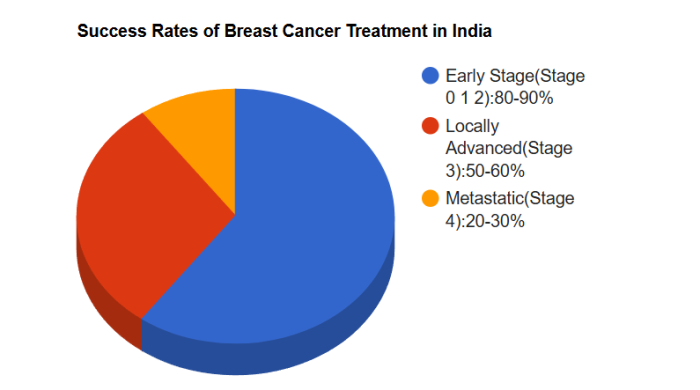
Success Rates Using Advanced Therapies for Breast Cancer in India
The success rates of breast cancer treatment in India depend on several factors, such as the stage of cancer at diagnosis, the patient’s overall health, and the specific treatment options used (surgery, chemotherapy, targeted therapy, etc.). Early-stage breast cancer (Stage I) has a higher success rate, with a 5-year survival rate of over 90% when detected and treated early.
Advanced stages (Stage III or IV) have lower survival rates, typically around 20-40%, as the cancer may have spread to other parts of the body. Advanced therapies like targeted therapy, immunotherapy, and hormonal therapy have shown promising results in treating breast cancer in India, particularly for advanced-stage cases.
Cost of Advanced Breast Cancer Treatment in India
The cost of advanced breast cancer treatment in India is relatively affordable compared to Western countries. On average, the total cost of treatment, including surgery, chemotherapy, targeted therapies, and immunotherapy, ranges from INR 4,00,000 to INR 10,00,000.
Factors such as the stage of cancer, specific treatment options, and the hospital you choose can significantly affect the overall cost. Leading cancer centers often provide comprehensive care that may influence the price but also contribute to improved outcomes and patient support.
Diagnosis Cost for Breast Cancer in India
The diagnosis cost for breast cancer in India can range from INR 20,000 to INR 50,000, depending on the tests required. Diagnostic procedures typically include mammograms, breast ultrasounds, CA 15-3 blood tests, biopsies, and sometimes genetic testing.
Early diagnosis is crucial as it can significantly improve treatment outcomes and reduce the overall cost of care, allowing for timely intervention and more effective management strategies.
How is Breast Cancer Diagnosed?
Breast cancer is diagnosed using a combination of methods. Initially, a clinical breast exam is performed to check for any abnormalities, such as lumps or changes in breast tissue. Imaging tests, such as mammograms and breast ultrasounds, are utilized to obtain detailed images of the breast. A biopsy is often conducted to obtain tissue samples for laboratory analysis, which helps confirm the diagnosis.
Additionally, a blood test may be performed to check for tumor markers, such as CA 15-3, which can indicate the presence of breast cancer. Early diagnosis through these methods is essential for effective treatment planning and improved outcomes.
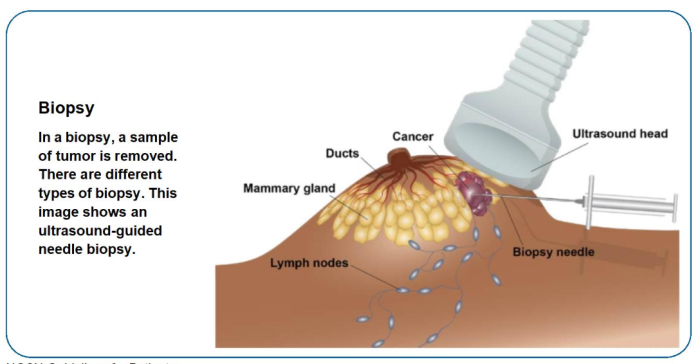
Risk Factors for Breast Cancer
Several risk factors increase the likelihood of developing breast cancer. Age is a significant factor, with the risk rising in women over 40. A family history of breast or ovarian cancer, particularly involving BRCA1 or BRCA2 mutations, greatly elevates the risk.
Other contributing factors include prolonged exposure to estrogen (due to hormone replacement therapy or early onset of menstruation and late menopause), a personal history of certain non-cancerous breast diseases, and a sedentary lifestyle. Lifestyle factors, such as obesity, excessive alcohol consumption, and a high-fat diet, also play a role in increasing the risk of breast cancer.
Minimally Invasive Surgery for Breast Cancer
Minimally invasive surgery, such as lumpectomy or robotic-assisted surgery, offers an alternative to traditional surgical approaches for certain breast cancer patients. These procedures involve smaller incisions, resulting in less pain, reduced scarring, shorter recovery times, and fewer complications.
Techniques like sentinel lymph node biopsy can also be performed minimally invasively, allowing for effective staging and treatment with minimal disruption to surrounding tissue. This approach can enhance the overall patient experience and improve recovery outcomes for those undergoing breast cancer treatment.
What is the role of precision medicine in breast cancer treatment?
Precision medicine tailors treatment based on the individual’s genetic makeup, allowing for targeted therapies that are more effective and have fewer side effects.
Can breast cancer be prevented?
While there is no sure way to prevent breast cancer, regular screening, a healthy diet, maintaining a healthy weight, and limiting alcohol can reduce the risk.
What lifestyle changes can help in breast cancer prevention?
Maintaining a healthy diet, exercising regularly, avoiding tobacco, limiting alcohol intake, and managing weight can help lower the risk of developing breast cancer.
What are the side effects of breast cancer treatment?
Common side effects include fatigue, nausea, hair loss, changes in appetite, and emotional changes. Specific side effects vary based on the treatment type.
How does hormone therapy work in breast cancer treatment?
Hormone therapy works by blocking the body's natural hormones (like estrogen) that fuel certain types of breast cancer, slowing or stopping cancer growth.
What is the importance of early detection in breast cancer?
Early detection significantly increases the chances of successful treatment and survival. Regular screenings can catch cancer at an earlier, more treatable stage.
How can I perform a self-exam for breast cancer?
A self-exam involves checking your breasts monthly for any lumps, changes, or abnormalities. It can be done in front of a mirror or while lying down.
What should I expect during a breast biopsy?
During a biopsy, a small sample of breast tissue is removed for examination. It can be done using a needle or through surgery. Local anesthesia is typically used.
What is the significance of BRCA mutations in breast cancer?
BRCA mutations significantly increase the risk of developing breast and ovarian cancer. Women with these mutations may consider preventive measures or more aggressive treatment options.
How often should I get screened for breast cancer?
Guidelines recommend women begin annual mammograms at age 40, or earlier based on personal or family history. It's essential to consult your healthcare provider for personalized recommendations.
Can men get breast cancer?
Yes, men can develop breast cancer, though it is much rarer than in women. Symptoms include lumps or changes in breast tissue.
What are the psychological impacts of breast cancer diagnosis?
A breast cancer diagnosis can lead to anxiety, depression, and emotional distress. Psychological support, counseling, and support groups can help manage these feelings.
What role do support groups play in breast cancer recovery?
Support groups provide emotional support, share experiences, and offer coping strategies, helping patients feel less isolated and more empowered during treatment.
How can I support a loved one with breast cancer?
Being there to listen, offering practical help (like meals or transportation), encouraging them to express their feelings, and participating in their treatment journey can provide valuable support.
Frequently Asked Questions about Oral Cancer
What tests will I have? How often will they be repeated?
Your doctor will likely order a variety of tests, including mammograms, ultrasounds, MRI scans, and biopsies. The frequency of these tests will depend on your specific case and how your treatment progresses. It's essential to discuss a testing schedule with your healthcare provider to understand what to expect.
Will my insurance pay for this test?
Coverage varies widely by insurance provider and plan. Contact your insurance company directly to verify coverage for specific tests. Your healthcare provider’s office can also assist you in determining what will be covered.
What will you do to make me comfortable during testing?
Your healthcare team can offer various comfort measures, such as local anesthesia for biopsies or sedatives if you are anxious. Discuss any concerns with your doctor beforehand so they can ensure your comfort.
What if I am pregnant or want to become pregnant soon?
Inform your doctor if you are pregnant or planning to become pregnant. Certain tests and treatments might not be safe during pregnancy. Your doctor can provide alternatives and discuss the best approach to manage your health and your baby's safety.
When will I have a biopsy?
A biopsy is typically scheduled after initial imaging tests suggest the presence of a suspicious area. Your doctor will coordinate the timing based on your overall treatment plan and urgency.
What are the risks with a biopsy?
Risks include infection, bleeding, and bruising. There is also a slight risk of changes in breast shape, depending on the biopsy method used. Discuss these risks with your doctor to understand how they are mitigated.
How will my biopsy be performed?
Biopsies can be performed using fine needle aspiration, core needle biopsy, or surgical biopsy. The choice depends on the location and size of the lump. Your doctor will explain the procedure and why it is the best option for you.
What else might be done during the biopsy?
During the biopsy, your doctor may place a small marker at the site of the tissue sample for future reference. Additional samples might be taken if necessary for more comprehensive testing.
How soon will I know the results and who will explain them to me?
Biopsy results typically take a few days to a week. Your doctor or a specialist will review the results with you, explain their significance, and discuss next steps.
How can I get a copy of the pathology report and other test results?
Request copies of all your test results from your doctor or the medical facility where the tests were conducted. They are legally required to provide you with this information upon request.
What will happen if I do nothing?
If untreated, breast cancer can progress, potentially spreading to other parts of the body (metastasize). Discussing the natural course of the disease with your doctor can help you understand the urgency and importance of treatment.
Which option is proven to work best for my cancer, age, overall health, and other risk factors?
Treatment plans are personalized based on numerous factors including cancer type, stage, and your overall health. Your doctor will recommend the most effective treatment based on clinical evidence and your individual circumstances.
What are the possible complications and side effects? Are any life-threatening?
Complications and side effects vary by treatment but can include fatigue, nausea, hair loss, and infection. Discuss the specific risks associated with your treatment plan to understand both common and severe potential side effects.
What can be done to prevent or relieve the side effects of treatment?
Side effect management may include medications, lifestyle adjustments, and supportive therapies such as physical therapy or counseling. Your healthcare team can provide comprehensive strategies to minimize discomfort.
Am I a candidate for a clinical trial?
Eligibility for clinical trials depends on factors like cancer type, stage, and previous treatments. Your doctor can help you explore clinical trials that might be appropriate for your condition.
Can I join a clinical trial at any time?
Participation in clinical trials is subject to specific inclusion criteria and timelines. Some trials may have enrollment windows, so it's important to discuss timing with your doctor.
What decisions must be made today?
Immediate decisions may include scheduling initial tests, starting treatment, and making lifestyle changes. Your doctor will prioritize decisions based on urgency and your treatment plan.
Is there a social worker or someone who can help me decide about treatment?
Many hospitals have social workers, patient navigators, or oncology nurses who can help you understand your options and provide support in making informed decisions.
Is there a hospital or treatment center you can recommend for breast cancer treatment?
Your doctor can recommend reputable hospitals and treatment centers that specialize in breast cancer. They may also refer you to a comprehensive cancer center with a multidisciplinary team.
Can I go to one hospital for surgery and a different center for radiation therapy?
Yes, you can receive treatment at different facilities. Coordination between your healthcare providers will ensure continuity of care. Discuss your preferences and options with your doctor.
Which treatment(s) do you recommend and why?
Your doctor will recommend treatments based on the type and stage of cancer, as well as your overall health. They will explain the rationale behind their recommendations.
Does the order of treatment matter?
The sequence of treatments can be crucial. For example, chemotherapy might be given before surgery (neoadjuvant therapy) to shrink tumors. Your doctor will outline the best order of treatments for your case.
When will I start treatment?
Treatment typically begins after all necessary tests are completed and a treatment plan is finalized. The timing depends on factors like scheduling, your health status, and the urgency of treatment.
How long will treatment last? What will it involve?
The duration and specifics of treatment vary widely. Chemotherapy and radiation therapy schedules are typically several weeks to months long. Your doctor will provide a detailed timeline and explain what each treatment entails.
Meenakshi's Journey Through Breast Cancer Treatment in India
I am Meenakshi. I live in the buzzing city of Pune (India). I am 39 years right now and completely healthy. Let me take you back in time, the year 2016; My 36th birthday celebration was still on, both at home and hospital. I work as a part-time therapist in a non-profit hospital. All my patients gathered to celebrate my birthday, and this really touched me. At home, my husband and my 3-year-old boy had baked a not-so-good-looking, but love-filled cake. I was thrilled, and it was the best way I could turn 36.
The next morning, while in the shower, I felt a lump in my breast. I assumed I was imagining it and was worrying for no reason. I ignored it for a few days and continued with my daily commitments.
After a long day at work, I was getting ready to go to bed when I felt the lump again. Now, it was almost a week, and I could feel the lump every day. I decided to ask Dr. Sushma, the GP in the OPD at my hospital. Dr. Sushma hesitated a bit after checking me. This got me extremely anxious and worried. She said, “I am not too sure, I think you should get a scan done’’, I looked at her with a curious eye and asked, “You mean, it might be cancer?” She quickly gathered herself and shrugged, “I am not sure, I think it’s better to get a test done before concluding anything.”
I was diagnosed with Stage 1 breast cancer. And, the only thing my oncologist told me, “Don’t be worried. You should be happy you got it checked so early. Early detection is really a plus. The cancer is at a stage when it can be treated, and you can be back to your regular normal life.”
I think this is what stuck to me the most. It’s a normal ailment that can be cured and I am going to work towards making that happen. This attitude of mine along with family support made me strong and we were ready to overcome everything that came our way.A few weeks later, came the turning point of my life. The tumor was surgically removed. Dr. Priya, my oncologist suggested to take up CanAssist Breast test to find out the breast cancer recurrence risk before going ahead with the treatment.
CanAssist Breast provided additional information about my tumor. The test results helped us to identify the likelihood of cancer returning to a distant site after surgery. Luckily, I was under the low-risk recurrence zone and I was spared from chemotherapy and its side-effects. This timely action of mine not only saved the cost of treatment but also helped me in leading a quality life.
Today, being a breast cancer survivor, I thank OncoStem and Dr. Manjiri for helping me take the most important and timely decision of my life. The decision to take CanAssistBreast test helped me in personalizing my treatment and leading a normal life.
Discover the Best Oncologists and Cancer Hospitals in India
When it comes to cancer treatment, finding the right specialist and hospital can make a significant difference in the outcome. In this blog, we have compiled a list of the top oncologists and cancer hospitals across major cities in India, ensuring that you have access to the best care available.
Top Oncologists in Major Cities
For those seeking expert oncologists, we have identified the best specialists in key cities:
Leading Cancer Hospitals
In addition to finding the right specialist, choosing the right hospital is crucial for comprehensive cancer care. Here are the top hospitals in major cities:
Conclusion
Finding the right oncologist and hospital is the first step in your cancer treatment journey. Explore the links above to learn more about the top specialists and hospitals in your area.
Related Resources
At ArogyaJivan, we strive to provide you with the most accurate and up-to-date information to help you make informed decisions about your healthcare. Whether you are searching for the Best Doctors in India or the Top 5 Doctors in India, our resources are tailored to guide you through your medical journey. Additionally, our comprehensive guides on the Best Hospitals in India and the Top 5 Hospitals in India will assist you in choosing the right healthcare facility for your needs. Explore these resources to ensure you receive the best possible care.
